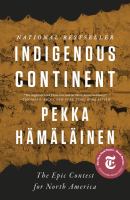
A New Look at History for Native American Heritage Month
A New Look at History for Native American Heritage Month
In the past 5 years, several books have been published showing a different side of the conquering and “civilizing” of the Americas. Native Americans had lived on the continent for several thousand years when Europeans arrived (Native Americans arrived somewhere between 15,000 and 30,000 years ago), and had complex and sophisticated societies. But their societies looked different than what European settlers had seen before, and were judged as being primitive and uncivilized. The books listed below will give you a different view of the colonization of the Americas and how U.S. history has left out Indigenous contributions to our society.
Indigenous continent : a new history of America by Hämäläinen, Pekka
This book posits that history we were told in school didn’t tell the whole story of European settlement of the Americas. Indigenous tribes still controlled much of the Americas until the 1890s, according to the author, and won battles against the European settlers. Far from being primitive, Indigenous tribes had sophisticated diplomacy and leadership structures that helped them thrive and survive. If you’re interested in learning the history of Indigenous peoples in America and Canada, this is a fascinating read.
Native nations : a millennium of indigenous change and persistence by DuVal, Kathleen
One of the fascinating facts this book shares is that North American cities once rivaled cities elsewhere in size and influence. But after a period of instability, North America communities moved away from urbanization and many smaller nations immerged. Thus, when European settlers arrived, they assumed the Indigenous peoples were less developed groups, rather than groups that had developed differently because of circumstances of nature and experience. Like Indigenous Continent, this book presents a new way of looking at colonial history in the Americas.
The rediscovery of America : native peoples and the unmaking of U.S. history by Blackhawk, Ned
As more scholars research the beginnings of the United States, more information emerges to show that Native tribes were thriving before Europeans came, and continued to thrive for many years afterwards. They were a huge part of the Revolutionary and Civil Wars, and influenced law and policy. Blackhawk weaves new information into what we’ve always been taught, and a better picture of what happened in the past emerges.
Covered with night : a story of murder and indigenous justice in early America by Eustace, Nicole
True-crime aficionados as well as history buffs will enjoy this book about the murder of an Indigenous hunter by two fur traders in colonial Pennsylvania on the eve of a summit between the Iroquois and the colonists in 1722. The different types of justice championed by the two groups – restorative versus punitive, forgiveness versus harsh punishment – led to a clash of ideals and the fear of an all-out war.
Seeds : stories of Afro-Indigenous resilience by Hunter, Dominique Daye
While this book is not non-fiction, we couldn’t make this list without including this work by Daye, a local author. The book consists of poems and short stories about the Afro-Indigenous culture in this area. This provides local connection to issues that affect Indigenous people across the country, and highlights the ways we can support Afro-Indigenous people in our community.
Mary Beth Adams is the Community Engagement Librarian for Alamance County Public Libraries. She can be reached at madams@alamancelibraries.org.




